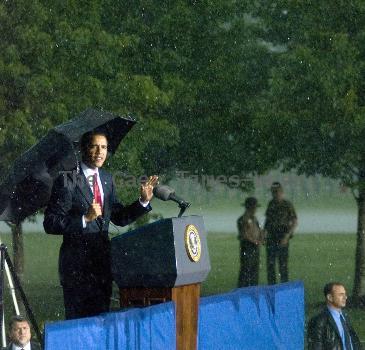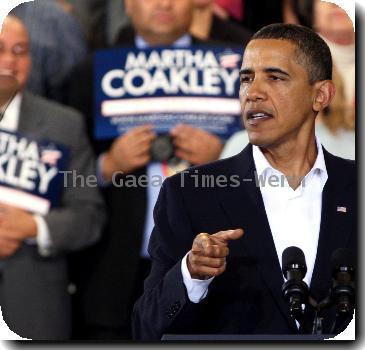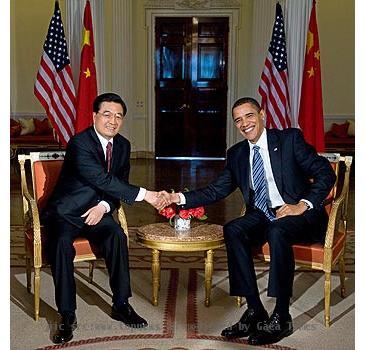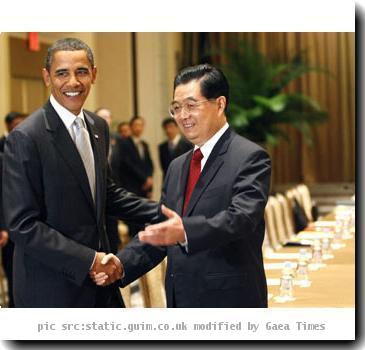China says it will allow more exchange rate flexibility, but no large-scale appreciation
By Cara Anna, APSaturday, June 19, 2010
China to allow more exchange rate flexibility
BEIJING — President Barack Obama welcomed China’s announcement Saturday that it will allow a more flexible exchange rate for its currency, saying it would help protect the economic recovery.
The announcement by China’s central bank suggested a possible break from the yuan’s two-year peg to the U.S. dollar — a source of friction between the two countries — but ruled out any large-scale appreciation.
The People’s Bank of China mentioned no specific policy changes, though markets will be watched closely Monday for the announcement’s effects. Chinese officials have said all along that reforms of the yuan, also known as the renminbi, or “people’s money,” will be gradual.
“It is desirable to proceed further with reform of the RMB exchange rate regime and increase the RMB exchange rate flexibility,” the central bank said in a statement posted on its website.
The announcement, timed just before President Hu Jintao’s trip to the G-20 summit in Toronto, Canada, follows warnings from Beijing earlier this week against making its currency policies a main focus of the meeting.
Beijing kept the yuan frozen against the dollar to help Chinese manufacturers compete amid weak global demand. It faces pressure from the United States and other trading partners who contend the yuan is undervalued.
“China’s decision to increase the flexibility of its exchange rate is a constructive step that can help safeguard the recovery and contribute to a more balanced global economy,” Obama said in a statement.
U.S. Treasury Secretary Timothy Geithner called the move an “important step.”
“But the test will be how far and how fast they let the currency appreciate,” he said.
The European Commission also welcomed the decision, saying it would help achieve more sustainable global economic growth, reduce trade imbalances and strengthen the stability of the international financial system.
But the announcement is unlikely to satisfy critics in the U.S. Congress, who argue that an undervalued Chinese currency gives China’s exporters an unfair advantage, costing millions of American jobs.
“This vague and limited statement of intentions is China’s typical response to pressure,” Sen. Charles Schumer, a New York Democrat, said in a statement. “Until there is more specific information about how quickly it will let its currency appreciate and by how much, we can have no good feeling that the Chinese will start playing by the rules.”
Signs that a global economic recovery has taken hold have prompted speculation that China would begin letting the yuan resume a gradual appreciation against the U.S. dollar that began in 2005 but was halted abruptly in 2008 as the global financial crisis took effect.
Since then, the yuan’s value has remained at roughly 6.83 to $1, although it is formally pegged to a basket of currencies that includes the U.S. dollar.
“It definitely sounds significant. They’re saying they’re going to press forward,” Stephen Green, an economist at Standard Chartered Bank in Shanghai, said of Saturday’s statement.
“We didn’t ever think they were going to do a big one-off, so it looks like that’s not going to happen,” he said. “We’re going to see more movement around a basically stable exchange rate until the global economy is basically healthier. The proof will be in the pudding on Monday.”
Chinese officials have warned that any adjustment to the exchange rate is not other countries’ concern.
The director of the international department of the People’s Bank of China, Zhang Tao, told a news conference Friday that Chinese leaders will not discuss the yuan at the G-20 summit.
Saturday’s statement pointed to economic growth both inside and outside China as a reason for the increase in exchange rate flexibility.
“The global economy is gradually recovering. The recovery and upturn of the Chinese economy has become more solid with the enhanced economic stability,” the central bank said.
However, it indicated no major policy changes, adding: “The exchange rate floating bands will remain the same as previously announced in the interbank foreign exchange market.”
Associated Press writers Elaine Kurtenbach in Shanghai and Tom Strong in Washington contributed to this report.
Online:
www.pbc.gov.cn/
Tags: Asia, Barack Obama, Beijing, China, China-currency, East Asia, Greater China, Hu Jintao, North America, Shanghai, Summits, United States






